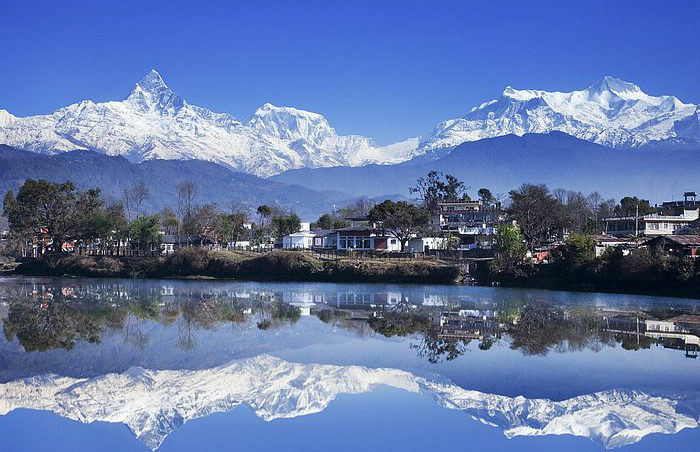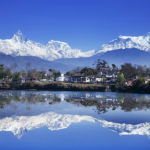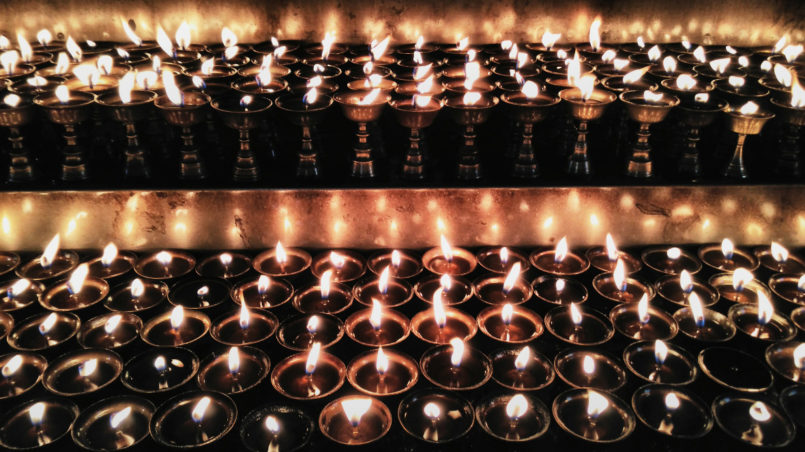Daily Spiritual Practice – New Things Need Time to Prosper

This is the third part of my series “30 days in a Buddhist monastery in Nepal”. I recommend you read my two previous articles (“The ‘November Course‘ at Kopan Monastery is completely different” und “Meeting my Inner Resistance“) first. I will now go on to describe my time after the “November Course” and how I apply what I have learned in everyday life, but also the hurdles I encounter in doing so.
When I leave Kopan Monastery, I work on the following points to integrate them more into my life:
- reduction of self-centeredness and the power of the ego;
- compassion for others; and
- to realise that everything I perceive are only projections of my mind and, therefore, only illusions of my own imagination. Consequently, to see life as something more flexible and flowing rather than rigid and corresponding to one’s own categories of “good” and “bad”.
The reality, which my dear mind cannot yet grasp, seems to have other intentions with me; it is important to understand that work on the self is much more subtle and the inner growth begins at the lowest level:
Observing yourself
I get sick for a week, have a lung infection and feel physically very weak. While I hardly leave my hotel room in Kathmandu, my mind falls into a deep hole. That’s not what I had in mind. After this long time in the monastery, I wanted to take the opportunity to reflect and see how I could apply what I had learned in everyday life. The expectations of my mind are being thrown aside. I have been consciously practising replacing expectations and dependencies at Kopan Monastery for so long – where has all this gone?
Then the long phase of observing my behaviour and emotional reactions in everyday life begins. This is often no fun and frustrating. After my recovery, I take a bus to Pokhara, a small town on a beautiful lake. The air here is much better than in the capital and I hope for the best conditions for my time of personal reflection.
Of course, I took the inner mood and emotions with me instead of leaving them behind in Kathmandu. But even the most beautiful place does not change the internal constitution. I get sick again, have to stay in bed for three days, spend a lot of time with myself and in my head, and can’t stop criticising myself for my reactions.
For example, I notice how I get angry when another person sits down in a chair I had placed in front of my window in the sun. I give in unthinkingly to my emotional reaction and point out to the woman that this is “my chair”, whereupon this only looks at me confusedly and leaves. After that, I feel miserable. Who do I think I am? And why don’t I keep my mind flexible in such situations?
One time, a woman in Pokhara speaks to me. She is very friendly and the first thing she asks me is how I am. I know immediately that she wants something from me that probably has to do with money, and I point out to her that I don’t want to buy anything. She says that she lives in the Tibetan refugee camp and sells jewellery, I could take a look at that. I repeat that I am not interested and our interaction is over. A second later the woman has the next tourist in her sights and walks towards her but the woman reacts openly and just as friendly. I observe this much more positive interaction in which openness, respect, and compassion are present, while I was confronting the needy woman with resistance and prejudice.
It seems to me as if I have fallen a thousand steps back on my path of mind training. What was much easier to understand and implement during the course in the monastery suddenly turns out to be much more difficult in everyday life. I look for a conversation with others. I don’t want to get stuck in my own head. Someone is pointing out to me that I shouldn’t doubt myself that much. This is, after all, part of the spiritual path:
Many spiritual practitioners from the West make the mistake of immediately being really good at everything. We do not want to realise at the beginning that work on the self can take an indefinable time to mature and flourish. We also have a very precise idea of what success should look like – and we expect it to be implemented as quickly and as perfectly as possible, without knowing how it actually works.
We are very strict with ourselves and want to avoid mistakes and relapses on the way, but these are inevitably part of the spiritual path. No mistakes, no growth. initially, this is a damper on one’s motivation, as there are not always obvious experiences of success that bear fruit for one’s own work on oneself.
As a counterbalance, I practice focusing more on the positive aspects. There are things I do well and things I don’t do so well. So why not congratulate myself on the positive things? And as already mentioned in my previous article: after such an intensive course, I quickly saw small progress and internal changes. I became more grateful and more open to life. Small mistakes and relapses are a part of it but do not exclude all the positive aspects by any means.
Translation German-English: Anna Dichen
Credits
| Image | Title | Author | License |
|---|---|---|---|
 |
Fewa_Lake_of_Pokhara- | Pitambar Bhattarai | CC BY-SA 4.0 |
 |
01_Kerzen im Tempel- | Lisa Dau | CC BY-SA 4.0 |

